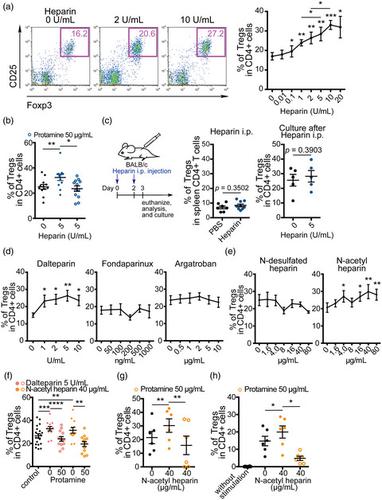当前位置:
X-MOL 学术
›
Clin. Exp. Immunol.
›
论文详情
Our official English website, www.x-mol.net, welcomes your
feedback! (Note: you will need to create a separate account there.)
Heparin affects the induction of regulatory T cells independent of anti-coagulant activity and suppresses allogeneic immune responses.
Clinical & Experimental Immunology ( IF 3.4 ) Pub Date : 2020-06-19 , DOI: 10.1111/cei.13480 Y Kashiwakura 1, 2 , H Kojima 1 , Y Kanno 1 , M Hashiguchi 1 , T Kobata 1
Clinical & Experimental Immunology ( IF 3.4 ) Pub Date : 2020-06-19 , DOI: 10.1111/cei.13480 Y Kashiwakura 1, 2 , H Kojima 1 , Y Kanno 1 , M Hashiguchi 1 , T Kobata 1
Affiliation

|
Heparin is a widely used anti‐coagulant that enhances anti‐thrombin (AT) activity. However, heparin also suppresses immune and inflammatory responses in various rodent models and clinical trials, respectively. The mechanism by which heparin suppresses immune responses is unclear. The effect of heparin on regulatory T cells (Tregs) in allogeneic immune responses was analysed using an acute graft‐versus‐host disease (aGVHD) mouse model and mixed lymphocyte reactions (MLRs). In‐vitro culture systems were utilized to study the effects of heparin on Tregs. Heparin administration reduced mortality rates and increased the proportion of Tregs in the early post‐transplantation period of aGVHD mice. In both murine and human MLRs, heparin increased Tregs and inhibited responder T cell proliferation. Heparin promoted functional CD4+CD25+forkhead box protein 3 (FoxP3)+ Treg generation from naive CD4+ T cells, increased interleukin (IL)‐2 production and enhanced the activation of pre‐existing Tregs with IL‐2. Heparin‐induced Treg increases were not associated with anti‐coagulant activity through AT, but required negatively charged sulphation of heparin. Importantly, N‐acetyl heparin, a chemically modified heparin without anti‐coagulant activity, induced Tregs and decreased mortality in aGVHD mice. Our results indicate that heparin contributes to Treg‐mediated immunosuppression through IL‐2 production and suggest that heparin derivatives may be useful for immunopathological control by efficient Treg induction.
中文翻译:

肝素影响调节性 T 细胞的诱导,与抗凝血活性无关,并抑制同种异体免疫反应。
肝素是一种广泛使用的抗凝血剂,可增强抗凝血酶 (AT) 活性。然而,肝素也分别在各种啮齿动物模型和临床试验中抑制免疫和炎症反应。肝素抑制免疫反应的机制尚不清楚。使用急性移植物抗宿主病 (aGVHD) 小鼠模型和混合淋巴细胞反应 (MLR)分析肝素对同种异体免疫反应中调节性 T 细胞 (T regs ) 的影响。体外培养系统被用来研究肝素对 T regs 的影响。肝素给药降低死亡率并增加 T regs的比例在 aGVHD 小鼠移植后早期。在小鼠和人类 MLR 中,肝素增加了 T regs并抑制了应答 T 细胞增殖。肝素促进官能CD4 + CD25 +叉头框蛋白3(的FoxP3)+ Ť REG从幼稚CD4代+ T细胞,白细胞介素增加(IL)-2生产和增强的预先存在的T中的活化暂存器与IL-2。肝素诱导的 T reg增加与通过 AT 的抗凝活性无关,但需要肝素带负电荷的硫酸盐化。重要的是,N-乙酰肝素是一种没有抗凝活性的化学修饰肝素,可诱导 T regs并降低 aGVHD 小鼠的死亡率。我们的结果表明,肝素通过产生 IL-2有助于 T reg介导的免疫抑制,并表明肝素衍生物可能通过有效的 T reg诱导用于免疫病理学控制。
更新日期:2020-06-19
中文翻译:

肝素影响调节性 T 细胞的诱导,与抗凝血活性无关,并抑制同种异体免疫反应。
肝素是一种广泛使用的抗凝血剂,可增强抗凝血酶 (AT) 活性。然而,肝素也分别在各种啮齿动物模型和临床试验中抑制免疫和炎症反应。肝素抑制免疫反应的机制尚不清楚。使用急性移植物抗宿主病 (aGVHD) 小鼠模型和混合淋巴细胞反应 (MLR)分析肝素对同种异体免疫反应中调节性 T 细胞 (T regs ) 的影响。体外培养系统被用来研究肝素对 T regs 的影响。肝素给药降低死亡率并增加 T regs的比例在 aGVHD 小鼠移植后早期。在小鼠和人类 MLR 中,肝素增加了 T regs并抑制了应答 T 细胞增殖。肝素促进官能CD4 + CD25 +叉头框蛋白3(的FoxP3)+ Ť REG从幼稚CD4代+ T细胞,白细胞介素增加(IL)-2生产和增强的预先存在的T中的活化暂存器与IL-2。肝素诱导的 T reg增加与通过 AT 的抗凝活性无关,但需要肝素带负电荷的硫酸盐化。重要的是,N-乙酰肝素是一种没有抗凝活性的化学修饰肝素,可诱导 T regs并降低 aGVHD 小鼠的死亡率。我们的结果表明,肝素通过产生 IL-2有助于 T reg介导的免疫抑制,并表明肝素衍生物可能通过有效的 T reg诱导用于免疫病理学控制。











































 京公网安备 11010802027423号
京公网安备 11010802027423号